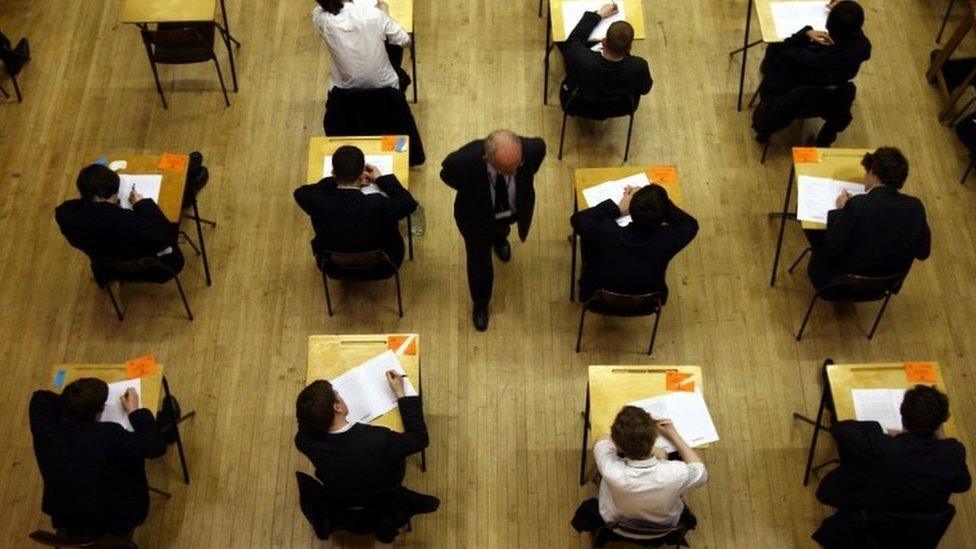A-level results in Wales: Senedd committee recalled
- Published

Education Minister Kirsty Williams met students at Merthyr College on results day
The Welsh Government's handling of exam results is to be "urgently" examined by a Senedd committee amid criticism over the grading of A-levels.
Students have accused the Welsh Government of "abandoning them" after 42% of grades were lowered by the exams watchdog.
As head teachers described the results as "unjust", the Senedd's education committee has been recalled.
But First Minister Mark Drakeford has said it was "a record year" for pupils.
"The big picture is we have more students achieving, more students achieving at the very top end of the scale, and a record number of people from Wales accepted into university," he told BBC Wales.
The handling of the results system has seen the Labour government come under fire from head teachers and some of its own backbenchers, who said some pupils had got results two grades lower than predicted.
Bradley Desmier was predicted a B, C and a merit but got a D, E and a pass
The Welsh Parliament is on its summer break, but the Children, Young People and Education Committee will now meet on Tuesday.
Chair Lynne Neagle said decision-makers must explain what happened to provide "clarity", ahead of the publication of GCSE results next week.
"Young people's well-being, and their ability to plan for their future learning and careers, will be at the centre of our work looking at these issues," she said.
"We recognise that these matters are complex and will need detailed, longer term consideration. However, we believe that there is an important role for us to play now, to ask questions which will ensure that a fair and clear approach is adopted and communicated to the Welsh people as quickly as possible."

Exams were cancelled after schools were closed in March
Mike Hedges, Labour member of the Senedd for Swansea East, had said he knew of pupils receiving a lower than predicted grade "without any samples of their work being checked".
But Mr Drakeford told BBC Radio Wales Breakfast: "I read what people said, and I don't agree that it was strong criticism."
Labour MS for Aberavon David Rees has backed calls for a "full review" to examine whether poorer areas have been more affected by the grading system than more affluent areas.
"The robust and fair quotes that the government is talking about is of course consistency across Wales, but I do not believe that that has actually been fair to individuals," he told BBC Radio Wales.
"These are young people whose futures are on the line."
Exams were cancelled this summer due to the coronavirus pandemic, with results based on teacher estimates.
But 42% were downgraded by exams watchdog, Qualifications Wales, after it judged the grades were "too generous".
On Wednesday, Education Minister Kirsty Williams promised that students would be guaranteed a grade no lower than they achieved at AS-level.
But with the last-minute intervention coming after results had already been sent to schools and colleges, there are concerns that universities may judge applications on the grades already issued, before that revision takes effect.
In an open letter to Ms Williams, 16 members of the Welsh Youth Parliament also called for action.

Welsh Youth Parliament member Jonathan Powell says students feel "abandoned"
A-level student and Wrexham youth parliament member Jonathan Powell said: "Not only have you abandoned thousands of students who did not have a chance to sit their exams, but you have demonstrated a lack of respect and trust in teachers across the nation."
He said he had been predicted to achieve A* and A grades, but was awarded a single A grade and Bs.
"How is it justifiable that A*s are brought down to Bs?" he asked.
Abbie Cooper, 17, from Cwmbran is another member of the youth parliament who signed the letter.
She said her predicted AS-level grades were downgraded from three Bs to an unclassified and two D grades.
"It kind of feels like they just got a number generator or a letter generator and given you a grade based on that," she said.
"It sucks because I need these to apply for university next year because these are my predicted for university. How can I go anywhere with these?"
She said it had left her felling "distraught" and she would now be appealing the results.
'It is such a let down'

Natalie Johns said her future was decided by people who did not know her work or what she could and had achieved
When Natalie Johns opened her A-level results on Thursday, the results were not what she was predicted.
The 18-year-old's teachers had calculated she would get all A*s, meaning she would meet the requirements of her conditional offer to study psychology at Cambridge University.
But when she opened her results at Y Pant School, in Rhondda Cynon Taff, her results had been lowered to one A* in biology, with As in maths and psychology.
The teenager had a desperate 24 hours after her chosen college said they could not accept her, and she was put in a "summer pool" waiting to see if another college would let her in.
But she has since had the good news she has been accepted after her school and MP got involved, but said she would still be fighting to get the grade changed.
"It is not important right now, but these A-level results are going to stick with me for life - if I am going for a job, it's not going to have a sticker next to it saying the grade is because of Covid-19," she said.
"It was such a let down, that this is how we were treated and how our [school] education came to an end."
Natalie said she was angry with the Welsh Government for their response to students' concerns.
"They are almost bragging about how you can't go lower than your AS grade, but you can't get an A* at AS-level," said Natalie.
"For high achievers wanting to go on to study medicine and other subjects, it really matters. It's the injustice of it."

Some pupils were pleased with their results
Head teachers in north Wales said the way results were allocated was "unfair" and "impossible to fathom", saying their own teachers' estimates had been done with "professionalism and fairness".
The Federation of North Wales Secondary School Head Teachers said many universities had lowered their offers due to a shortage of international students during the pandemic.
But while that meant many students would be able to attend their university of choice, the A-level grades would be "with them for the rest of their lives".
Claire Armitstead, head teacher of Rhyl High School, said the system had generated "numerous inconsistencies".
"It can never be forgotten that every inconsistency is a child whose life has been turned upside by an algorithm and this cannot be allowed to happen," she said.
"It is unjust and immoral and our children deserve better."
Geraint Parry, head teacher at Ysgol Brynhyfryd, in Ruthin, Denbighshire, said: "Students have been disregarded, downgraded and simply told 'computer says no'."
Ellen Williams, head of Llanrug's Ysgol Brynrefail, Gwynedd, said the grading system had "resulted in many of our young people's lives being devastated".

Plaid Cymru's leader also urged Mr Drakeford to ensure pupils in Wales awarded lower grades received their predicted results instead.
In a letter to the first minister, Adam Price said this should also apply to next week's GCSE results "and this should be communicated to learners today, for peace of mind".
Mr Price pointed to comments from the UK Labour leader Keir Starmer, who has said ministers in England must follow the lead of Scotland and allow teacher assessed marks to be accepted.
But Wales' first minister said Mr Starmer was referring to the position in: "England, where they don't have AS-levels; England where you have to pay for an appeal; England where people will be kept waiting for longer for results than they have here in Wales.
"Our position is very different."

A pupil from Swansea checking her results on Thursday
A Welsh Government spokesman said about 94% of the grades were the same or within one grade of those students were predicted to achieve.
"This is before any adjustments are made as a result of the AS [level] floor announced yesterday by the minister for education," he added.
"We have also asked Qualifications Wales to consider whether the grounds for appeal can be broadened for all A-level, AS-level and GCSE qualifications and we expect to provide more information on this next week.
"No student from Wales should be disadvantaged against other UK students.
"We are pleased that, following the publication of the results today, UCAS have reported the highest number of Welsh learners being offered a place at university since 2011."
- Published13 August 2020

- Published12 August 2020
